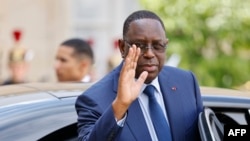Reactions at home and abroad were almost universally positive after Sall, ending months of feverish speculation, said that after "long consideration" he had decided against contesting next February's ballot
In his nationwide address late Monday, Sall said he had sought to prioritise Senegal's progress, "in particular at a time of social-economic difficulties and uncertainties."
"Senegal is more than me, and is full of capable leaders for the country's development," he said.
Praise for Sall poured in from outside Senegal, a country cherished as a beacon of democracy and stability in a notoriously turbulent region.
"Senegal is again delivering proof of the solidity of its long democratic tradition," France, the former colonial power, said via its foreign ministry.
U.N. Secretary-General Antonio Gutterres posted on Twitter saying Say's Sall's "decision represents a very important example for his country and the world."
"I would like to express my deep appreciation for ... the statesmanship he has shown."
Moussa Faki, head of the African Union's commission, hailed Sall as a "statesman" for a "wise and salutary decision" that, he said, had put the national interests first.
"The Senegalese democratic model... is the pride of Africa," he said.
Tuesday newspapers in Dakar paid lavish tribute to Sall and many local residents said they believed the country had dodged a bullet.
"His speech changes many things. Senegal has become stable and governable. I am 200-percent happy," said Issa Camara, who works in the maritime sector.
"I feel relief and pride... the outlook is good," said Hassame Drabo, a company executive.
Alioune Tine, a veteran campaigner on the three-term issue, described Sall's words as a "deliverance... a great speech," while former prime minister Abdoul Mbaye said he felt "greatly moved" by what he said was Sall's principled stance.
Many Senegalese had expected Sall to say he would seek a third term, igniting a showdown with opponents who said he was breaching the constitution.
Sall's fiercest critic, Ousmane Sonko, on Sunday urged the public to rise "en masse" against a man he had painted as corrupt and a would-be dictator.
Opposition figures said Sall had been forced to change his plans because of public indignation.
"If President Macky agreed to throw in the towel... it's because there were Senegalese who stood up to him," said former prime minister Aminata Toure.
Sall, 61, was first elected in 2012 for a seven-year term and again in 2019 for a five-year term, following a constitutional revision of the presidential tenure.
The constitution stipulates that a president cannot serve more than two terms -- but Sall's supporters had argued the counter had been reset to zero thanks to the 2016 revision.
Sall had previously campaigned against a third term by his predecessor, Abdoulaye Wade, who was in power from 2000 to 2012, and had said he would not seek re-election, bucking the continent's trend of entrenched strongmen leaders.
But in recent months Sall had remained coy about whether he would bid for a third term, stoking an ambiguity exploited by opposition leader Sonko.
Clashes between the security forces and Sonko supporters last month left 16 dead, according to the authorities, while Amnesty International put the toll at 24 and the opposition at 30.
With Sall out of the race, talk also turned swiftly to how the elections may unfold.
Sonko is currently ineligible, as he was handed a two-year jail term in a sexual abuse trial - a case that sparked sporadic unrest over two years, culminating in the deadly clashes on his conviction last month.
But his spokesman on Tuesday implied his campaign would continue, tweeting a picture of Sonko accompanied by the words "Focus 2024."











Forum